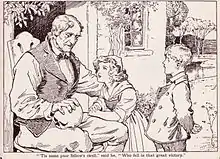After Blenheim
"After Blenheim" is an anti-war poem written by English Romantic poet laureate Robert Southey in 1796. The poem is set at the site of the Battle of Blenheim (1704), with the questions of two small children about a skull one of them has found. Their grandfather, an old man, tells them of burned homes, civilian casualties, and rotting corpses, while repeatedly calling it "a famous victory". The poem depicts the common man's ignorance of the motives of wars.

Characters and summary
The speaking characters are Old Kaspar, whose father lived in Blenheim, his granddaughter Wilhelmine, and his grandson Peterkin.
Old Kaspar has finished his work and is sitting in the sun in front of his cottage, watching his little granddaughter playing. Peterkin, his grandson, has been rolling a hard round object he found near the stream. He brings it to the old man, who explains that it is a human skull (line 17–18) and that he often finds them while ploughing in the garden (line 22–18). The children anticipate a story—"And little Wilhelmine looks up/with wonder-waiting eyes" (ln 26–27). Kaspar explains to the children the story of the battle and that the Duke of Marlborough routed the French, although he admits he never understood the reason for the war himself.
He also mentions that his father had a cottage by the rivulet—"My father lived at Blenheim then"—where Peterkin found the skull, until the soldiers burned it to the ground, and his father and mother had fled, with their child. The following verse refers to a childing mother, or a mother with child (ln 45–46) and many of them died with their newborns, possibly alluding to his own mother.
Thousands of corpses lay rotting in the fields, but he shrugs it off, as part of the cost of war (ln 53—54). Wilhelmine says it was a wicked thing, but he contradicts her, saying it was a famous victory. The poem is a scathing commentary on "man's cruelty to man".
Criticism
While Southey's verse "After Blenheim" is considered to be an anti-war poem, arguably Southey was not himself anti-war. Byron considered Southey a puzzle: on the one hand, he denigrated the English victory at Blenheim; on the other, he praised the Battle of Waterloo in The Poet's Pilgrimage to Waterloo, a popular poem that generated £215 in two months of publication.[1]
It is one of Southey's most famous poems.[2] The internal repetition of but 'twas a famous victory juxtaposed with the initial five lines of each stanza, establish that the narrator does not know why the battle was fought, why thousands died, why his father's cottage was burned. The often-quoted[3] closing lines are:
"But what good came of it at last?"
Quoth little Peterkin.
"Why that I cannot tell," said he,"But 'twas a famous victory."
"After Blenheim", also called "Battle of Blenheim", was written during Southey's Jacobin years (roughly 1790 – 1800). In a letter to Charles Collins, he wrote of travelling through Woodstock in the summer of 1793, and of refusing to even turn his head to look at the walls of the palace, built by Marlborough, and named for the battle.[4] Southey wrote the poem, sometimes considered by critics as the most celebrated as British anti-war poems, while living at Westbury with his mother and his cousin (Peggy) in a renovated ale-house, which he shared also with a "great carroty cat".[5] It appeared in publication with several others, in the category of Ballads and metrical tales,[6] with the revenge tale of Lord William, and the narrative Queen Oracca.[7]

By 1820 Southey had changed his mind about the battle, describing it as the "greatest victory which had ever done honour to British arms". He calculated that had the battle not been won, the dominance of France may have overset the Protestant Succession in Britain.[8]
References
- Lionel Madden. Robert Southey: the critical heritage. Taylor and Francis, 1996, ISBN 0-415-13444-7, p. 21, p. 267.
- William Arthur Speck. Robert Southey: entire man of letters. New Haven: Yale University Press, 2006, ISBN 0-300-11681-0, p. 74.
- e.g. included in Bartlett's Familiar Quotations
- Robert Southey. The life and correspondence of Robert Southey. New York, Harper & Brothers, 1855, p. 64.
- Speck, p. 74.
- Robert Southey, Poems. London, New York, Macmillan and Co., 1895, pp. 54–57.
- Southey, pp. 50–62.
- Speck, p. 180.
